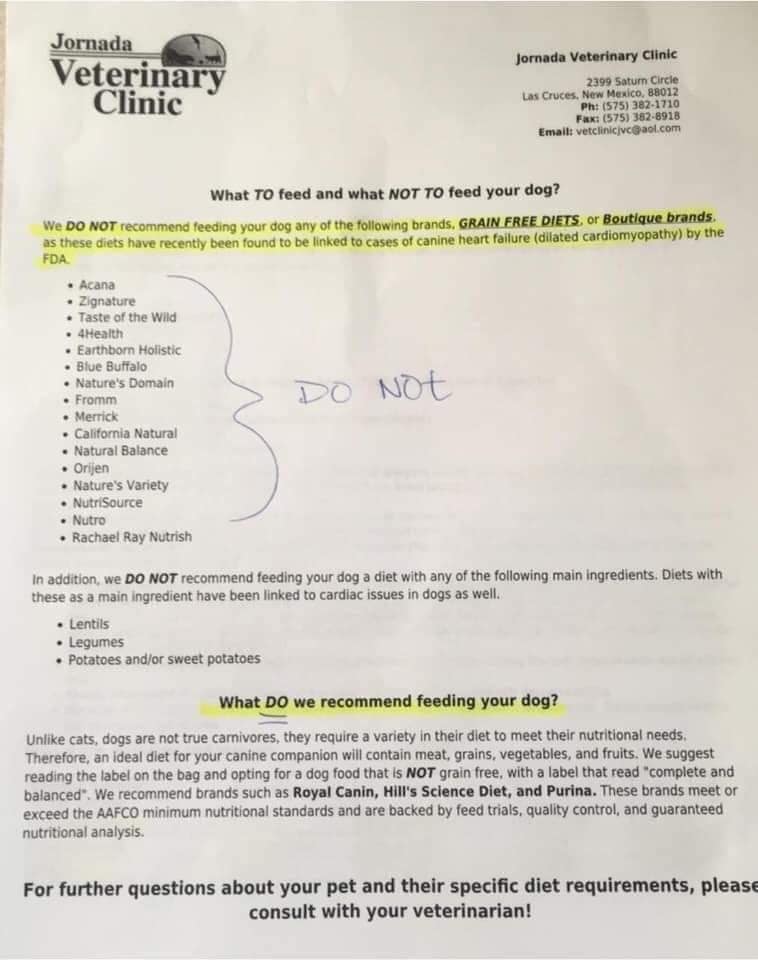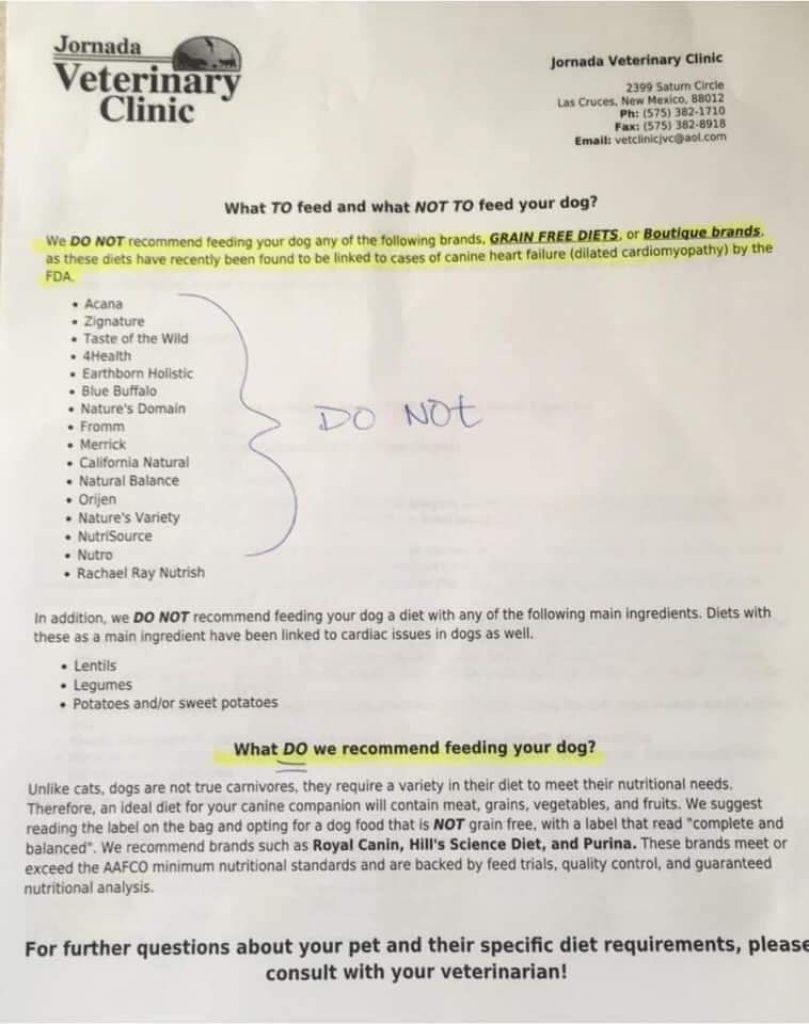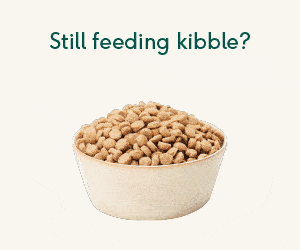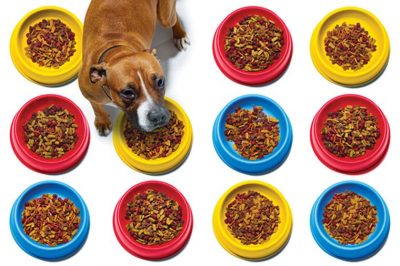
Off the back of the FDA investigation into a potential link between grain-free boutique foods and a rare condition Canine Dilated Cardiomyopathy (DCM) which was never substantiated, a social media viral arose which unfortunately adds to yet more misinformation on the Internet.
Years on, and we continue to see this information continuously regurgitated throughout social media pet groups.
It is important not to hold Jornada Veterinary Clinic accountable for the misinformation, as like many veterinary practices they were passing on information which they believed was in the best interest of their clients.
This article takes a look at the Jornada Veterinary Clinic dog food letter, how it came about, and what we can learn about it as consumers, pet owners, and pet industry professionals.
Also, perhaps we really should consider the root entities who probably should be held accountable, and why the misinformation arose in the first place.
The Jornada Veterinary Clinic dog food letter
It’s best to start at the beginning, so below is the Jornada Veterinary Clinic dog food letter titled – “What TO feed and what NOT TO feed your dog?”

The viral, a scanned letter by a client, targets 16 brands of pet food. Many of those pet food brands were hit hard when the FDA bizarrely named them without causative proof, and the resulting viral misinformation has had a terrible impact on those brands to this day.
We should not underestimate the damage caused to those companies, most of whom were trying to better the health of our pets with better products, as well as the impact to employees and stakeholders in those companies.
To understand the matter fully, read our article on understanding grain-free dog foods and heart problems. It discusses the root theory by Dr Lisa Freeman, on the payroll of numerous grain-based pet food manufacturers, which itself claims there is no evidence. The article also discusses the ensuing FDA investigation which was unable to find causative proof.
In retrospect a lot may be learned from the Jornada Veterinary Clinic dog food letter, by consumers, veterinary professionals, and academics alike. With many beliefs in the pet product space (and yes this is very much about pet products), the ominous truth is just beneath the surface.
Corn for cats
I’ll sidetrack for a moment, as new readers to this website probably won’t know where I’m coming from. For the sake of those who question my credibility vs information provided from a veterinary clinic, then I’ll offer you a clear contradiction in terms which obliterates the credibility of the Jordana Veterinary Clinic letter.
Ready?
The final paragraph of the letter states “Unlike cats, dogs are not true carnivores“.
Or in other words, cats are true carnivores.
I don’t think this is disputed anywhere in the world, by any scientist, or any vet.
With this in mind, the Jordana Veterinary Clinic letter specifically recommends Royal Canin (Mars), Hill’s Science Diet (Colgate-Palmolive), and Purina (Nestle).
Take a look at the ingredients of any of those dry food brands, for truly carnivorous cats, and question why they are mostly formulated from corn (maize), wheat, cereals, by-products of cereals, or rice.
How does that make sense?
Ironically some of these brands were fed to DCM dogs within the study, yet these cases have been omitted from the list given by Jordana Veterinary Clinic.
In fact, most publications surrounding the FDA investigation into a potential link between grain-free foods and Canine Dilated Cardiomyopathy (DCM) omitted the brands made from grains.
Right, back on topic… (unless you want to read more on why dogs are better categorised as facultative carnivores rather than omnivores)
What may be learned from the Jornada Veterinary Clinic dog food letter?
We live in an age where information gets spread around the world by social media in a way never possible before.
As individuals we readily believe information we are told to be true, especially when it looks to come from a credible source. Most of the time we never think for a second it may be false or not overly accurate.
The FDA would be a credible source, would it not?
Well, it should be, but in this case, for whatever reason, they got it wrong.
Perhaps the FDA as what should be a credible source should be held accountable for one of the biggest myths in pet nutrition of the current time?
Science, misinterpreted
Unfortunately social media gives misinformation power to appear substantial fact, even when it isn’t. Over the past years I have personally seen this phenomena occur in the pet food industry numerous times, particularly in relation to canine and feline nutrition.
Another example was a tenuous hypothesis between chicken necks and another rare condition APN. The research was inconclusive, yet the article published by the University of Sydney who conducted the research was worded in a way it appeared more “fact”. Media and social media did the rest, and it convinced veterinary professionals worldwide.
In most cases such as this, a mere 10 minutes reading the source research offers a vastly different truth to the one publicised.
Also, more often than not, the source has some form of tie to a corporate pet food manufacturer, and in every case has a monetary benefit to those entities.
Question everything
As individuals we should learn to question everything. If we don’t ask questions, how do we learn?
Jornada Veterinary Clinic, like many other veterinary practices and media outlets worldwide, had a responsibility to investigate the true source.
Unfortunately, due to believing what we’re told, not knowing where to look, or simply being busy, this is rarely done.
A veterinary practice may want to alert their clients out of the goodness of their hearts. A media outlet may have the same moral value, or perhaps only see it as an opportunity for clicks and credibility.
As individuals we should be aware information is often unreliable, and this is inconclusive of information with scientific research as a tenuous source – it’s easily spun.
Be responsible when sharing information, especially if you are a “credible source”
Before sharing a viral social media post we should think to ourselves “Do I know this information to be true?”.
This is especially the case if you are a credible source, such as an academic, nutritionist, veterinary professional, or a veterinary clinic.
As a veterinary professional, and I can’t stress this enough, we should always question commercial pet food products as a potential cause of illness.
Even those from Colgate-Palmolive (Hill’s), Nestle Purina, or Mars Petcare, especially if these brands were recommended at any point during your veterinary studies.
Failing to consider diet as a cause of illness is one of the biggest oversights in the veterinary profession to this day.
Jornada Veterinary Clinic dog food letter – transposed
For brevity, the text of the viral letter which should not be relied on for factual information is as follows:
What TO feed and what NOT TO feed your dog?
We DO NOT recommend feeding your dog any of the following brands. GRAIN FREE DIETS, or Boutique Brands, as these diets have recently been found to be linked to cases of canine heart failure (dilated cardiomyopathy) by the FDA.
- Acana
- Zignature
- Taste of the Wild
- 4Health
- Earthborn Holistic
- Blue Buffalo
- Nature’s Domain
- Fromm
- Merrick
- California Natural
- Natural Balance
- Orijen
- Nature’s Variety
- NutriSource
- Nutro
- Rachel Ray Nutrish
In addition, we DO NOT recommend feeding your dog a diet with any of the following main ingredients. Diets with these as a main ingredient have been linked to cardiac issues in dogs as well.
- Lentils
- Legumes
- Potatoes and/or sweet potatoes
What DO we recommend feeding your dog?
[final paragraph paraphrased below – can be read in picture above]
If you see a viral such as the one originating from Jordana Veterinary Clinic, or see a social media post about grain-free boutique diets causing heart failure or Canine Dilated Cardiomyopathy, then whatever you do, do not share it. Unfortunately many others will, and the inevitable consequence of that is a failure to understand the nutritional needs of our dogs.







It would be very beneficial for someone, anyone would list the food that are a reasonable cost for the working class to purchase. No one wants to come right out and say a brand. I have a senior 125# pound GSD (not overweight) and a 2 month old Shorkie. I feed them both Kirkland brand but for most of the 55 years of pet ownership it was Purina.
Hi Barbara, I’ve always found Kirkland well priced considering the ingredients, so I would recommend it in that respect. It’s difficult to recommend cheaper brands because they’re almost always cheap because they sacrifice nutrition to keep the cost down (and profit up).
Personally I mix diets, and take advantage of cheap raw meats/offal/bones, supermarket discounts, or for larger dogs it’s always worth taking advantage of sales or buying bulk. Canidae All Life Stages is possibly another option, only available in big bags, and a good mix of ingredients, price, and decent consumer feedback.